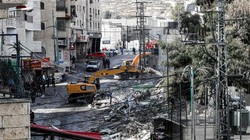 The Supreme Court of Israel has reportedly approved plans for the demolition of 100 Palestinian apartments units on the southeastern outskirts of occupied East Jerusalem al-Quds on the grounds that they have been built close to the separation wall that snakes across occupied Palestinian territories and isolates large swathes of them.
The Supreme Court of Israel has reportedly approved plans for the demolition of 100 Palestinian apartments units on the southeastern outskirts of occupied East Jerusalem al-Quds on the grounds that they have been built close to the separation wall that snakes across occupied Palestinian territories and isolates large swathes of them. RNA - The court argued that the units constructed in the Wadi Abu al-Hummus neighborhood “pose a security threat” due to their proximity to the wall, ordering the residents to demolish them by July 18 or embrace for hefty fines and demolition costs in case the so-called Municipality of Jerusalem al-Quds moves to raze the apartments.
Director of the Mapping and Geographic Information Systems Department of the Arab Studies Society, Khalil Tufakji, said when Israeli officials started the construction of the separation wall back in 2003, the locals filed a complaint against the planned route of the wall as it passed through the center of the neighborhood.
Israeli authorities then made changes to the route, keeping the entire neighborhood inside the boundaries of the wall.
According to Press TV, there are around 6,000 Palestinians living in the Wadi Abu al-Hummus neighborhood, who now all face displacement, especially after the court only granted them less than a month to demolish their apartments.
International bodies and rights groups say Israeli demolitions of Palestinian structures in the occupied West Bank and East Jerusalem al-Quds are an attempt to uproot Palestinians from their native territory and confiscate more land for the expansion of illegal settlements.
Israel has been occupying the West Bank, including East al-Quds, since 1967. Ever since, it has been building settlements throughout the land, in a move condemned by the UN and considered illegal under international law.
About 600,000 Israelis live in over 230 illegal settlements in the West Bank and East Jerusalem al-Quds.
847/940